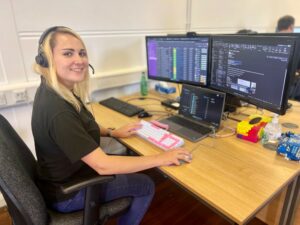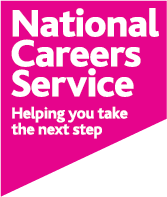Next in our Career Breakers series is Lucy Read, an IT Service Engineer, whose journey in the tech world is nothing short of inspiring. Join us as we explore Lucy’s path from being the go-to tech expert in her family to overcoming educational challenges and finding her niche in the IT realm.

Name: Lucy Read
Job Title: IT Engineer
Growing up, I’d always been a bit of a quiet person, keeping to myself, and finding entertainment online through silly games and watching videos. As time went on, I started finding myself becoming more competent with computers and before long, I was the go-to girl in the family for any tech issues.
As my adult life began, I struggled to find stable work as I didn’t have the strongest education. I left school at 16 to attend college studying art, but then dropped out before completing a single module.
I eventually found a position in retail, selling refurbished computers. Here, I was able to start developing my customer service skills and a couple of the engineers started teaching me the basics of computer repair. This hands-on, problem-solving work really resonated with me, and as I gained more experience, I started to tackle more complex issues. As time went on, I started finding myself becoming quite passionate about technology and I started to build my knowledge further through free educational content online.
Over the next couple of years, I stayed in a similar position but shifted between employers, moving up the ladder one step at a time until I settled with my current employer, ADM Computing. I’ve since been able to further expand both my technical and customer service skill set, and even started to gain some Microsoft accreditations.
In my current role, the largest challenge for me was right at the start, moving in to a new, far larger company where I would be the one and only female engineer on a 60+ strong team.
Initially, I was very anxious about this, but I soon found that it really didn’t matter! All of my colleagues have been incredibly respectful, and I’ve been judged on my technical ability and work ethic rather than a stereotype.
My most rewarding success so far has to be achieving my first Microsoft certification last year. As a result of this, I was then promoted to a fully qualified engineer in a record time after joining the company. Just a few months later, I then won multiple awards for best customer service and was named “Best New Starter” at my employer’s annual awards event.
I’m very lucky with my current employer as we have wonderful customers and only offer business-to-business services. While some callers do assume I’m a receptionist and ask to be transferred to an engineer, I’m able to demonstrate my knowledge by actioning the caller’s request myself, immediately while they’re still on the call. This can sometimes leave callers a little surprised!
In previous roles, I’ve worked in public facing positions and I would often be dismissed or simply ignored by customers, as again, they would assume I’m a receptionist or just working on the retail side. One particular time, a customer walked into the store, I asked “how I can help?”, and they immediately turned to my male colleague while exclaiming “I’d like to speak to an expert, thank you!” Rather embarrassingly for the customer, my colleague was a new trainee. He rather gingerly apologised and then proceeded to ask me how to fix the customer’s issue, all while the customer stood there looking a bit shocked.
One of my favourite things about working in a support-based role is that I get to spend my time helping others, which I personally find hugely rewarding. In addition to this, I have a huge passion for learning and I’m constantly gaining valuable industry skills in a high demand sector.
While this line of work can feel daunting as a woman in highly technical, competitive and male dominated industry, I’ve found that I’m able to thrive through my strong organisation, research and communication skills.
For other women looking to join a similar sector, I would stress that it’s more about communication and the ability to find information rather than simply knowing everything. It’s seen as a bit of a joke, but IT really is a lot of Googling! There’s no requirement or expectation to memorise every little detail. And unfortunately, while stereotypes do exist, it’s incredibly satisfying to challenge these and prove people wrong with my technical ability!
I believe that the industry as a whole needs to establish inclusive policies and look for the potential in people rather than simply their accolades or knowledge. In addition to this, the tech sector needs to work harder to address the gender pay gap as this still considerably above the national average1.
Finally, I think that women and girls need to look past the constructed stereotype that technology is a ‘man’s job.’ We need to stop listening to what people tell us we can and can’t do!
Follow the Career Breakers series on our website throughout January to stay connected with these empowering stories of individuals who have reshaped their careers and challenged gender stereotypes. For real-time updates, connect with us on social media using the hashtag #CareerBreakers.
The National Careers Service provides free, up to date, impartial information, advice and guidance on careers, skills and the labour market in England to anyone aged 13 and upwards. To speak to a National Careers Service adviser, call 0800 100 900 or use our webchat. Lines are available from: 8am – 8pm Monday – Friday, and 10am – 5pm Saturday
